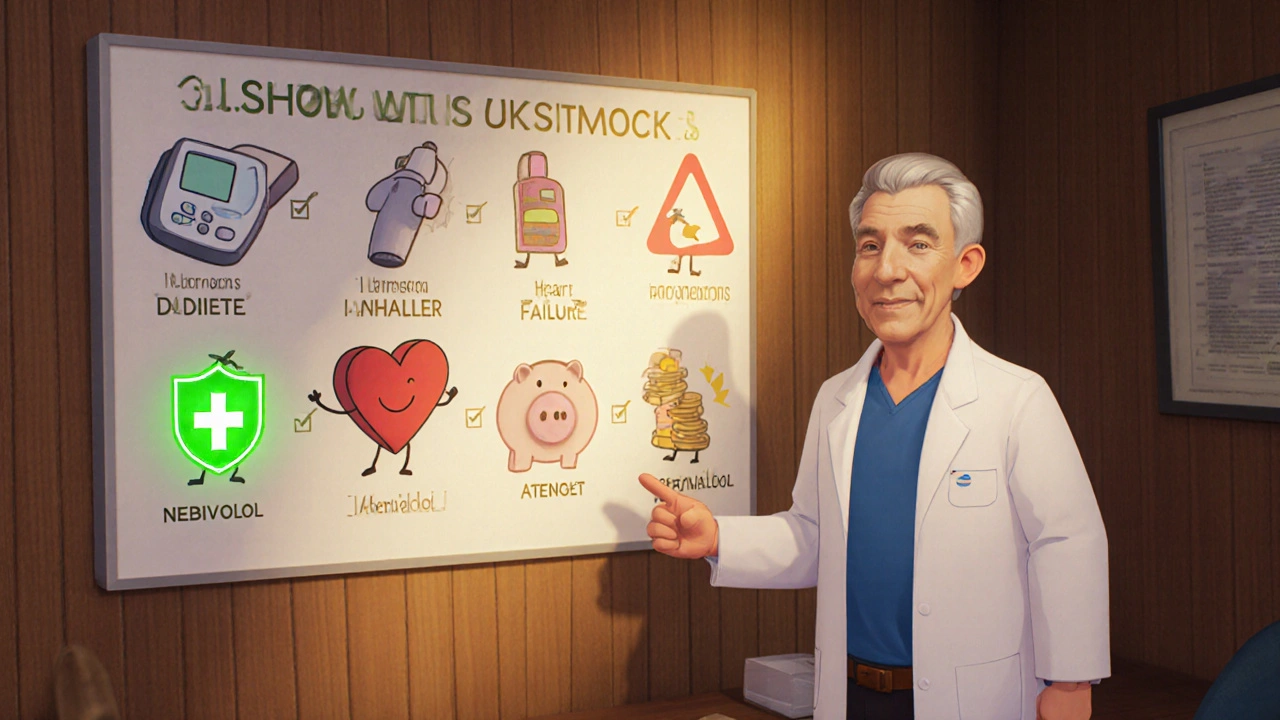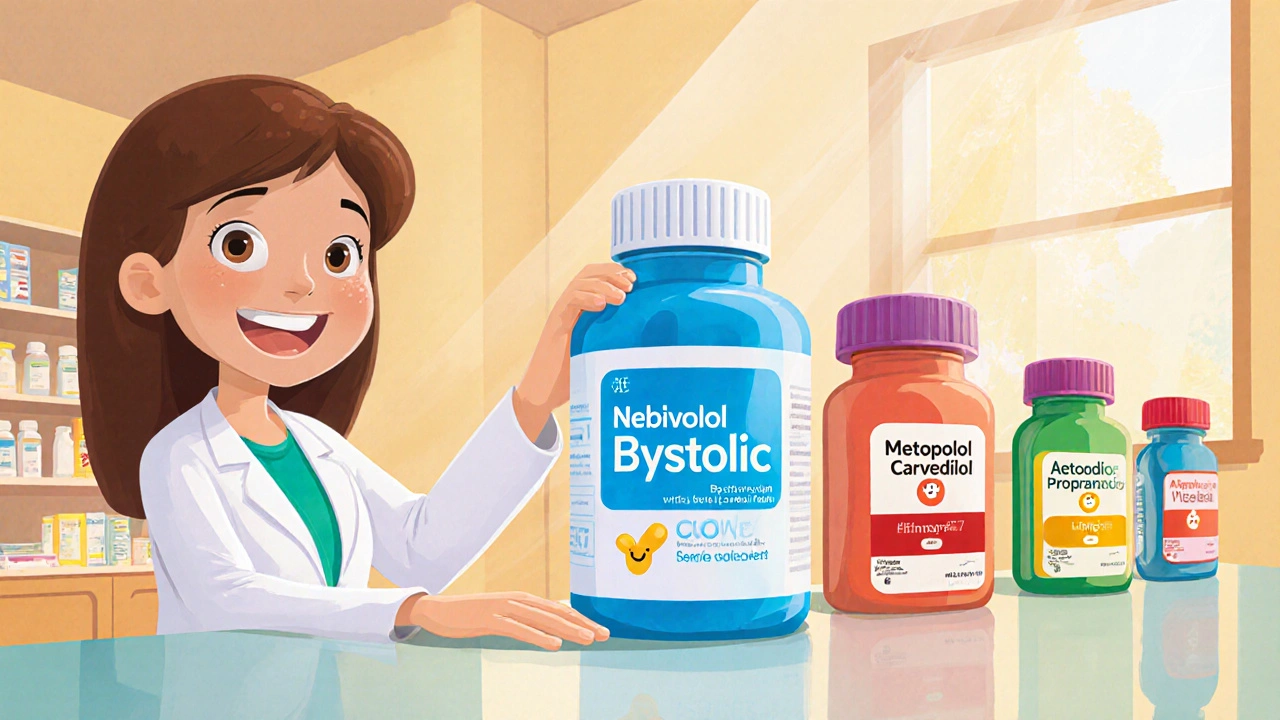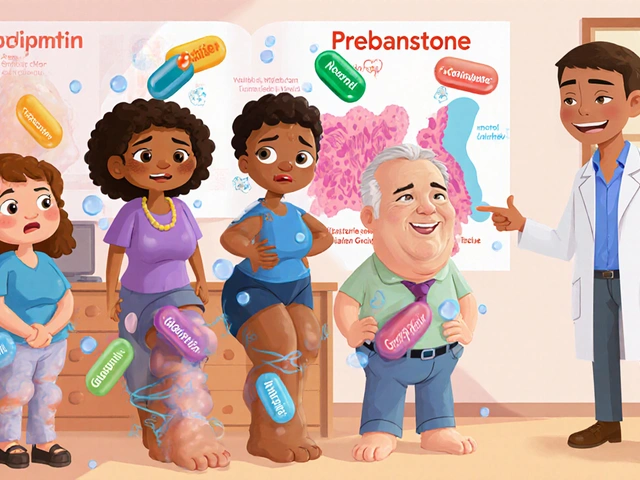Bystolic is a brand‑name beta‑blocker whose active ingredient is Nebivolol. It’s prescribed mainly for high blood pressure and, in some regions, for heart failure. If you’re wondering how it stacks up against other options, you’re not alone - doctors, pharmacists, and patients often ask the same question when deciding which drug fits their health profile.
Why a Comparison Matters
Blood‑pressure control isn’t a one‑size‑fits‑all situation. Factors such as side‑effect tolerance, co‑existing conditions, and even genetic differences can sway the choice. Comparing Nebivolol to its peers helps you understand the trade‑offs before you or your clinician make a decision.
Key Players in the Beta‑Blocker Class
Besides Nebivolol, the market includes a handful of long‑standing drugs. We’ll focus on the most common alternatives that appear in prescribing guidelines:
- Atenolol
- Metoprolol
- Carvedilol
- Propranolol
- Lisinopril (an ACE inhibitor often used when beta‑blockers aren’t enough)
Side‑Effect Profile at a Glance
| Drug | Common Side‑Effects | Rare but Serious | Impact on Metabolic Conditions |
|---|---|---|---|
| Nebivolol | Headache, dizziness, fatigue | Bradycardia, bronchospasm (in asthmatics) | Neutral to slightly positive on insulin sensitivity |
| Atenolol | Cold extremities, fatigue, sleep disturbances | Severe bradycardia, AV block | May worsen lipid profile |
| Metoprolol | Fatigue, depression, shortness of breath | Heart block, severe bronchospasm | Can raise blood glucose modestly |
| Carvedilol | Dizziness, weight gain, orthostatic hypotension | Worsening heart failure if started too fast | Improves insulin resistance in some studies |
| Propranolol | Cold hands/feet, fatigue, sleep issues | Severe bronchospasm, heart block | Can mask hypoglycemia symptoms |
| Lisinopril | Cough, dizziness, hyperkalemia | Angioedema (rare but serious) | Neutral to beneficial for renal function |
Effectiveness in Controlling Blood Pressure
Clinical trials consistently show that Nebivolol lowers systolic pressure by an average of 12‑15 mmHg, comparable to other beta‑blockers. What makes it stand out is its nitric‑oxide‑mediated vasodilation, which can lead to slightly better nighttime blood‑pressure control.
Atenolol usually drops systolic pressure by 10‑13 mmHg, but it’s less effective at reducing central aortic pressure - a factor linked to long‑term cardiovascular risk.
Metoprolol and Carvedilol tend to be chosen for patients who also need heart‑failure support, because they improve ejection fraction while still controlling hypertension.
Special Populations: Diabetes, Asthma, and Elderly
For patients with type‑2 diabetes, Nebivolol is often preferred because its impact on glucose metabolism is neutral to mildly positive. In contrast, traditional beta‑blockers like Propranolol can mask hypoglycemia warning signs.
Asthmatic patients should avoid non‑selective agents. Nebivolol and Atenolol are β1‑selective, reducing the risk of bronchospasm compared with Propranolol.
Older adults often report fatigue with beta‑blockers. Carvedilol may cause more dizziness due to its α‑blocking activity, while Nebivolol typically has a gentler onset, making dose titration easier.
Cost and Accessibility in 2025
In the UK, the NHS typically lists a generic Nebivolol at around £5‑£7 for a 30‑day supply, similar to generic Atenolol. Brand‑name Bystolic runs a bit higher, roughly £15 for the same period.
Generic Metoprolol and Propranolol are among the cheapest beta‑blockers, often below £3 per month. Carvedilol sits in the mid‑range (£6‑£9).
When insurance coverage is tight, clinicians might default to the lowest‑cost option, but the overall therapeutic benefit should guide the final pick.
Practical Decision‑Making Checklist
- Do you have co‑existing diabetes? Consider Nebivolol for its neutral glucose effect.
- Is asthma a concern? Choose a β1‑selective agent like Atenolol or Nebivolol over non‑selective options.
- Need heart‑failure support? Carvedilol or Metoprolol have proven mortality benefits.
- Budget‑tight? Generic Atenolol or Propranolol are the cheapest.
- Concerned about metabolic syndrome? Nebivolol or Carvedilol may improve insulin sensitivity.

How to Switch Safely
Never stop a beta‑blocker abruptly; that can trigger rebound hypertension. Here’s a simple taper plan when moving from a traditional agent to Nebivolol:
- Reduce current dose by 25 % and hold for 5‑7 days.
- Introduce Nebivolol at 2.5 mg once daily (or the lowest possible dose).
- Monitor blood pressure and heart rate twice daily for the first week.
- If stable, reduce the old drug by another 25 % and continue.
- Complete the transition over 3‑4 weeks, adjusting based on tolerance.
Always involve your prescriber - they might order an ECG or kidney‑function test before the switch.
Frequently Asked Questions
Is Nebulolol the same as Nebivolol?
The correct spelling is Nebivolol. “Nebulolol” is a common typo but refers to the same medication.
Can I take Bystolic with a ACE inhibitor like Lisinopril?
Yes, the combination is frequently prescribed for difficult‑to‑control hypertension. Monitor potassium levels and renal function periodically.
What makes Nebivolol different from Metoprolol?
Nebivolol uniquely releases nitric oxide, causing extra vasodilation. Metoprolol lacks this effect, so Nebivolol may achieve better night‑time BP control.
Are there any food or drug interactions to watch for?
Alcohol can amplify dizziness. Combine with other heart‑rate‑lowering drugs (e.g., calcium‑channel blockers) only under medical supervision.
How quickly does Bystolic start working?
Peak plasma concentration occurs about 1‑2 hours after a dose, but full BP‑lowering effect may take 2‑4 weeks of consistent therapy.
Bottom Line
If you need a beta‑blocker that’s gentle on metabolism, offers extra vasodilation, and works well for patients with mild asthma, Nebivolol (or its brand Bystolic) is a solid pick. For heart‑failure patients, Carvedilol still holds the strongest evidence. When price is the main driver, cheap generic options like Atenolol or Propranolol work fine if side‑effects are not a concern.
Talk to your prescriber about your full medical picture - the best drug is the one that aligns with your health goals, other meds, and budget.





One comment
Honestly, Bystolic is just a pricey gimmick – the alleged NO-mediated vasodilation is overhyped, and the alpha‑adrenergic blockade claims are flimsy at best! 🚀
Great rundown – Nebivolol’s metabolic edge really shines for diabetic patients.
Look, the pharma giants want you to believe Nebivolol is a miracle, but the hidden data shows it’s just a repackaged atenolol with a fancy name. The truth is out there, and they won’t tell you.
Ths article is supe helpful, I apprciate the clear checjklist – especially the tip about never stopping a beta‑blocker cold. Thx!
Esteemed author, your exhaustive comparison is nothing short of a literary masterpiece – truly, who needs concise guidelines when we can wade through endless tables? :)
Nebivolol, marketed as Bystolic, offers a unique mechanism of action through nitric‑oxide release, which distinguishes it from traditional β‑blockers.
This vasodilatory effect can translate into modestly better nighttime blood‑pressure control, a point often underappreciated in clinical practice.
When selecting a β‑blocker for a patient with type‑2 diabetes, the neutral or slightly positive impact of Nebivolol on insulin sensitivity is a valuable advantage.
In contrast, agents such as Propranolol may mask hypoglycaemia symptoms, posing safety concerns for insulin‑treated individuals.
For patients with concomitant asthma, the β1‑selectivity of Nebivolol reduces the risk of bronchospasm compared with non‑selective drugs like Propranolol.
Cost considerations remain paramount; generic Nebivolol is priced similarly to generic Atenolol in many health systems, though brand‑name Bystolic carries a premium.
The tapering protocol outlined in the article – a 25 % dose reduction every week – aligns with established guidelines to avoid rebound hypertension.
It is also prudent to monitor heart rate and blood pressure twice daily during the transition, as abrupt changes can precipitate arrhythmias.
Clinicians should be aware that combining Nebivolol with ACE inhibitors such as Lisinopril is generally safe, but periodic checks of renal function and electrolytes are advisable.
In heart‑failure patients, carvedilol continues to hold the strongest mortality benefit, yet Nebivolol may be appropriate when pulmonary disease coexists.
The tables in the article accurately reflect the common side‑effects, but patients should be counseled that fatigue and dizziness are often transient during dose titration.
Real‑world adherence tends to improve with drugs that have a gentler onset of action, which is another reason some prescribers favor Nebivolol.
When insurance formularies prioritize the lowest‑cost option, clinicians must balance economic constraints with individual patient tolerability.
Ultimately, shared decision‑making, incorporating patient preferences, comorbidities, and budget, results in the most satisfactory therapeutic outcome.
This comprehensive approach mirrors contemporary hypertension guidelines that emphasize personalized therapy.
Keep this checklist handy the next time you evaluate antihypertensive regimens.
Honestly, most people just chase the cheapest pill without reading the data – Nebivolol isn’t magic, but it’s definitely a smarter pick than a generic atenolol for many. 😏👍
Stop ignoring the metabolic data! Nebivolol’s neutral glucose profile versus the lipid‑worsening effect of atenolol makes it the clear choice for patients with metabolic syndrome, and the literature backs this up.
Did you know the FDA data on Nebivolol’s NO‑release is selectively released? They hide the full trials that show limited benefit – wake up, people.
Blood pressure drops, mood lifts – nebivolol works.
The pharmacodynamic profile of nebivolol, characterized by β1‑selectivity and endothelial nitric‑oxide synthesis, warrants its consideration in patients where metabolic neutrality is paramount.
Let’s get moving! If you’re battling hypertension and want a drug that won’t sabotage your energy or glucose levels, give nebivolol a try – your heart will thank you.
The analysis is thorough, yet it glosses over the real-world adherence challenges that many patients face with any β‑blocker regimen.
America’s strength lies in its ability to innovate, and nebivolol is a testament to superior pharmaceutical engineering that outperforms outdated foreign β‑blockers.